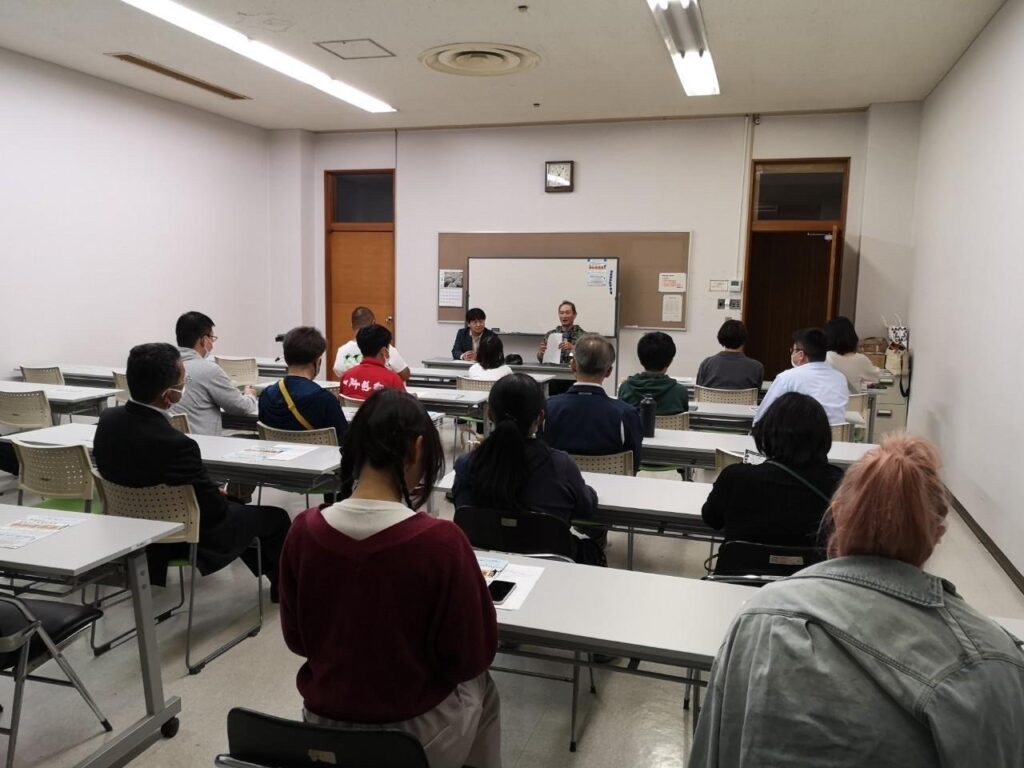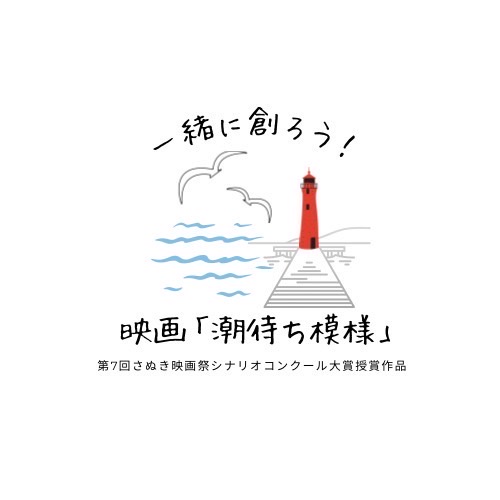さぬき映画祭シナリオコンクール大賞受賞作品「潮待ち模様」
・「潮待ち模様」映画制作の意図

少子高齢化の進む日本において、漁業の現場では成り手が少なくなり漁業従事者は減少するばか りで現役世代は60代、70代と高齢化が進み後継者問題は深刻である。また日本人の食文化の 変化により魚よりも肉の消費量が増え魚の価格もどんどん高くなり益々魚離れが加速している。 こうした状況で昔ほど儲からなくなった漁業への従事者が減り悪循環を生み出しており、このま までは日本の漁業、特に個人事業者として漁業に従事する人が居なくなれば日本人の食文化も大 きく変化してしまう事でしょう。そうした懸念から行政も「漁業塾」など漁業従事者育成に力を 入れ始めていますし、民間でも寂れゆく港を活性化する為にプロジェクトを立ち上げております (津田港わくわくプロジェクトなど)。 そんな折にコロナ禍と言うこれまでに無い経済的にも社会的にも大変な危機が訪れ世の中のいろ んな仕組みが大きく変化して行きました。そうした社会情勢の中で職を失ったり、生活の為に望 まぬ職業に従事しなければならずストレスを抱え苦しんでいる人も大勢いる昨今、昔ほど儲から ないし収入が安定している訳では無いにしても自身の努力と働きで稼ぎを得る事が出来る個人漁 業主は若者に限らず全ての非正規労働者にとって一つの職業として十分に魅力があるのでは無い かと感じております。また本作では技能実習生のイスラム教の少女が登場しますが、今後の日本社 会において益々増えるであろう文化も習慣も違う外国人との交流を織り交ぜて、日本の漁業や 港、海、魚食文化の魅力を後世に繋げる為にその魅力を伝える手段として映画制作を企画いたし ました。 舞台となる「津田漁港」で30年以上の漁師経験のある地元の漁師さんに何度も取材を行いリア ルな漁師の現状や魅力、また周辺の名勝や名物などもふんだんに取り入れてヒューマンラブス トーリーとして観る人に楽しんでいただける事でしょう。
そして単にシナリオを映像化するだけでは無く、今後の映画祭の活性化を目指し、より多くの県 内の脚本家や映像作家になりたいと思う人の助けに成れればと思っております。幸運にも本作品 はさぬき映画祭シナリオコンクールにおいて大賞を受賞させて頂き制作費の助成を受けて映画化 出来る事となりました。しかし、作品を映像化するにおいて映画祭開始当初とは社会が大きく変 化する中で毎回制作に関わる人達、出演している役者の人達、撮影機材が以前よりも安価で高性 能化する中で単純な映像手法で撮影される映像などなど、ほとんど変化しないですがこれまでの 受賞作品の映像化の様に単に役者やスタッフの経験者を集めて制作するのではなく、関心はある んだがその機会に恵まれなかったり、参加を躊躇してしまった方達にも参加して頂く事で新たな 能力のある人材の発掘、才能の開花が期待でき今後のさぬき映画祭が活性化し応募作品が増えて 作品のクオリティ向上すれば、これまで以上に香川県のPRにも貢献出来る筈です。その為に本作品の映像制作では様々な試みを取り入れて撮影を行いモデルケースとなる事を目指します。その試 みに関して詳しい内容は後述いたします。
The Intent Behind the Making of "Shiomachi Moyou" (Tides Waiting Pattern)
In Japan, where the population is aging and the birthrate is declining, the fishing industry is facing a serious issue. The number of fishermen is steadily decreasing, and the current workforce is aging, with many in their 60s and 70s. The issue of succession is becoming more urgent. Additionally, changes in Japanese food culture, such as an increasing preference for meat over fish, have caused fish prices to rise, accelerating the trend of people distancing themselves from seafood. As a result, fewer people are entering the fishing industry, creating a vicious cycle. If this continues, Japan's fishing industry, particularly individual fishers, may disappear, leading to significant changes in the country's food culture.
In response to this concern, local governments have begun initiatives such as "fishing schools" to train new fishing professionals, while private sectors are launching projects to revitalize declining ports, such as the "Tsuda Port Waku Waku Project." In the midst of all this, the unprecedented economic and social crisis of the COVID-19 pandemic arrived, causing dramatic changes in various societal structures. In this context, many people have lost their jobs or had to work in unwanted professions to make ends meet, experiencing stress and suffering. Despite the fact that fishing is no longer as profitable as before and the income is not stable, I believe that the profession of an independent fisherman, where one can earn based on personal effort and work, could be an attractive option not only for young people but also for all non-regular workers.
In this film, a young Muslim girl from a foreign country, who is a technical intern trainee, will also appear. In Japan's increasingly multicultural society, interactions with foreigners from different cultural and religious backgrounds will only increase. Through this film, I aim to convey the charm of Japan's fishing industry, its ports, seas, and food culture to future generations.
The story is set at "Tsuda Fishing Port," where we conducted multiple interviews with local fishermen who have over 30 years of experience. We aim to present a realistic portrayal of the current situation and appeal of the fishing industry, while also incorporating the region's famous landmarks and local specialties. This will create a human love story that will entertain viewers.
Rather than simply turning the script into a film, I hope to contribute to the revitalization of future film festivals and assist aspiring screenwriters and filmmakers in the prefecture. Fortunately, this project won the Grand Prize at the Sanuki Film Festival Script Competition, which allowed us to receive production funding and move forward with the film. However, as society has drastically changed since the festival's inception, the people involved in production, the actors, and even filming equipment have become more affordable and higher in performance. While the basic methods of filming have not changed significantly, unlike past award-winning works that simply gathered experienced actors and staff for production, we are looking to involve people who have an interest but have not had the opportunity to participate, or who may have hesitated. This way, we expect to discover new talented individuals, which will help revitalize the Sanuki Film Festival. As more works are submitted and the quality of films improves, we hope it will contribute even more to promoting Kagawa Prefecture.
For this reason, we will incorporate various experiments in the filming process for this project, aiming to serve as a model case. Details of these experiments will be provided later.
